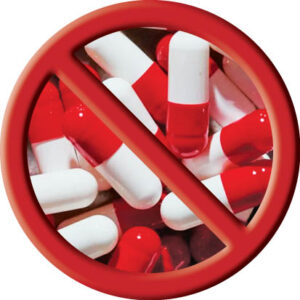Dr. Trishala Chopra is an alternative medicine specialist commanding a decade of success in managing Diabetes, Obesity, PCOD/PCOS, Metabolic Disorders, Gut-health and Sleep-disorders. As a Health Coach, Dr. Trishala empowers your body’s potential to heal itself through a balanced ‘Gut-Mind-Body’ approach to help you achieve your wellness goals. [To connect with Dr. Trishala, Call/Message: (+91) 9930831317 or Email ID: drtrishalachopra@gmail.com]
 Almost everyone is aware of antibiotics. Ideally, you need a prescription by a registered medical practitioner to consume antibiotics for your medical condition. During the pandemic, I witnessed antibiotics being sold over-the-counter like hot cakes! Of course, we all wish to heal from illness, but unfortunately, most are unaware of the harmful effects of antibiotics consumed without medical prescription.
Almost everyone is aware of antibiotics. Ideally, you need a prescription by a registered medical practitioner to consume antibiotics for your medical condition. During the pandemic, I witnessed antibiotics being sold over-the-counter like hot cakes! Of course, we all wish to heal from illness, but unfortunately, most are unaware of the harmful effects of antibiotics consumed without medical prescription.
The emphasis of my last couple of articles has been on gut health. As we focus on making our gut healthy and improving our microbiome, discussing antibiotics is crucial. Antibiotics are essential. They are powerful, life-saving drugs which help people recover from serious and potentially fatal infections. If used appropriately, antibiotics are a boon.
Unfortunately, today we are faced with the issue of ‘antibiotics overuse/misuse’, which lead to unwanted side-effects, that people are unaware of. It’s important to know of the impact of antibiotics on your gut and health, so that you are empowered to make the right decisions for yourself and your loved ones, in the long run.
What Are Antibiotics? An antibiotic is a type of anti-microbial substance designed to target bacteria, by either preventing its growth or killing it. Some antibiotics are specialised to target specific bacteria, while most others target a wider spectrum.
How Do Antibiotics Affect Our Gut Microbiome? Antibiotics target both, bad and good bacteria, resulting in the disruption of your Gut Microbiota (GM). This could lead to either diarrhoea or severe constipation. About 40% of people taking antibiotics face issues with their poop cycle. The side effects of altering microbiome can last from a few weeks to a few years! That’s why we need to practice caution and make informed decisions before we consume them.
What Is ‘Antibiotic Resistance’? Antibiotic resistance occurs when bacteria adapt to the consumed antibiotics that were designed to destroy them. The infection worsens even with antibiotics being in the system! This means that certain antibiotics can no longer be effective in treating some life-threatening infections, and the treatment will become very difficult. The more antibiotics you consume, the greater the chances of developing ‘antibiotic-resistance’, which is very dangerous. There’s been a significant rise in ‘antibiotic-resistance’ cases during the pandemic, which makes it challenging to treat majority of the infections in such patients.
Can We Stop Or Reduce This? Yes! All you need to do is stop taking antibiotics when not needed or unless medically prescribed due to absolute necessity. You don’t need antibiotics to treat the viral flu or a viral infection. Antibiotics work against BACTERIA – they don’t fight cold, cough, ear or throat infections that are caused due to VIRUSES. Self-medication is risky since you aren’t aware of the side effects. If the infection can be treated on its own, avoid medications as much as you can.
Let’s explore a few things we can follow while we are on antibiotics, as prescribed by a registered health care practitioner. Here are a few Top tips to take care of your microbiome / gut-health, when on antibiotics:
- Eat plenty of colourful fruits, veggies and whole grains. This helps in diversifying the gut microbiome and helps revive some of the good bacteria that were lost during the course.
- Complete your antibiotic course as prescribed. I see people randomly starting and stopping antibiotics, when they feel slightly better. You cannot stop randomly – you must complete the dose to get the complete benefits and reduce the risk of ‘antibiotic resistance’.
- Take a probiotic supplement while you are on antibiotics and continue taking it for a minimum of 2 weeks after you complete the antibiotics course. This helps reduce antibiotic-associated diarrhoea or constipation.
So, which probiotic supplement works during antibiotics? It’s best to get in touch with a gut-health expert to know about the strain that will work for your specific condition. The following strain that I’m suggesting works in most cases and harmless. However, you must always read the labels of different probiotic supplements as per the information below:
Strain:
Lactobacillus rhamnosus (GG)
OR
Saccharomyces boulardii
Dose:
For Lactobacillus – 6 billion CFU twice per day
For Saccharomyces – 5 billion CFU twice per day
Form: Capsule Or Powder
Duration: While taking the antibiotics + 2 weeks after completing the dose
Timing: 2 hours after breakfast and dinner
I believe knowledge is power! In my ongoing Gut-health workshops, my emphasis is as much on educating a patient as it is on treating them back to health. Make informed decisions! Make your gut happy!
- Healing or Harmful? - 15 March2025
- The Parsi Woman’s Guide To Superfoods For Hormonal Health - 8 March2025
- Strengthen Your Constitution This Republic Day! - 25 January2025
